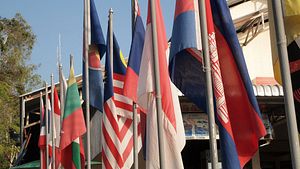A push has begun for the Association of Southeast Asian Nations (ASEAN) to take a long hard look at establishing its own criminal court, perhaps based along similar lines as the International Criminal Court (ICC) in The Hague.
According to Muzaffar Syah Mallow from the Faculty of Syariah and Law Universiti Sains Islam Malaysia, this would go a long way toward protecting the interests of the 650 million people who live in the region and guaranteeing their human rights.
“The necessity for such a court comes amid the ongoing inhumane treatment, persecution, and possible ethnic cleansing of the Rohingya people in Myanmar,” he recently wrote.
“Having such a special court at the ASEAN level is crucial as it can perform as a legislative body to monitor the conduct of all 10 member states toward their citizens.”
Such a court would breathe some much needed fresh air into ASEAN, where corrupt and bloody-minded leaderships have blighted efforts to launch a free trade bloc with a moral backbone capable of delivering basic living standards for all.
Nowhere is this more obvious than in the Myanmar state of Rakhine, where the Muslim Rohingya population has suffered enormously in recent years, trashing the reputation of Nobel Laureate Aung San Suu Kyi who has failed to end the violence during her first year in power.
Instead, she blamed the international community – the same people who supported her throughout the difficult years of military rule that tested and made her – for stoking the tensions that have resulted in at least 86 deaths and forced 10,000 people to flee into neighboring Bangladesh.
Mallow says an ASEAN criminal court should be allowed to carry out any criminal prosecution of any regional government or individuals who have breached international human rights conventions and norms or committed hideous crimes toward their people or anyone within ASEAN.
On that basis, it could be used to put on trial lower level Khmer Rouge leaders responsible for atrocities committed down the chain of command once the United Nations back court is finished with its current mandate of trying surviving senior leaders in Phnom Penh.
Philippine President Rodrigo Duterte would also be a candidate. Human rights lawyers are already arguing there is a case to be made against him and his lethal crackdown on drug dealers, which has resulted in the police-orchestrated killings of thousands.
Vietnamese responsible for the forced expulsion of ethnic Chinese in the aftermath of Hanoi’s 1975 annexation of South Vietnam could also rate as candidates for a tribunal. The expulsions followed border conflicts with China triggered by Hanoi’s 1978 invasion of Cambodia and Beijing’s support for Pol Pot.
Taib Mahmud, who ruled Malaysia’s state of Sarawak for 33 years, would be another potential candidate after retiring with a family fortune worth $20 billion, which environmentalists largely argue was pilfered from the local indigenous people as much as the state itself.
Individuals and families like the Ampatuans would also potentially make ideal candidates, with the Filipino judicial system still unable to find justice for what was one of the largest massacres in history – 58 people, including 32 media staffers butchered and shot in the lead-up to an election in 2009.
However, if an ASEAN court followed the ICC model, then justice for the victims of recent historical tragedies will probably miss out. The ICC was not allowed to prosecute crimes committed before its launch in July 1, 2002.
This helped get many of the countries and their leaders, fearing its wrath, on board. A similar deal would probably be needed if all ten members of ASEAN were to reach an agreement on such a court.
“The functions and powers of such a special court can follow the model adopted by the ICC … which has the jurisdiction to prosecute individuals for the international crimes of genocide, crimes against humanity, and war crimes,” Mallow said while acknowledging the court would require “a lot of time, energy, and even money to turn into reality.”
The ICC has also expanded its brief to include land-grabbing, an enormous issue in the developing countries the world over and especially in ASEAN.
Mallow said his suggestion might seem to some as attractive only in theory; however, he added it would send a clear signal to all regional governments that the era of mass killings and persecution has come to an end.
“They must respect the laws and rights of the people because their actions will not be forgotten or ignored without any legal consequences or responsibility. It is just a matter of time before the above suggestion becomes reality,” he said.
It’s a fair warning, and one worth heeding.
Luke Hunt can be followed on Twitter @lukeanthonyhunt

































